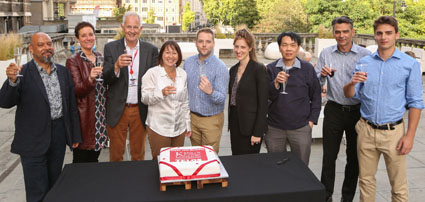School research centres celebrate milestones
Two of the research centres in The Dickson Poon School of Law have marked the anniversary of their founding with one-day conferences celebrating their work. The Centre of Construction Law and the Centre for Technology, Ethics & Law in Society (TELOS) both held events in June 2017 to mark their 30
th and 10
th anniversaries respectively.
Changes Challenges & Surprises in UK & Transnational Construction Law
 Held at the beginning of June, the conference Changes Challenges & Surprises in UK & Transnational Construction Law marked 30 years of construction law at King's.
Held at the beginning of June, the conference Changes Challenges & Surprises in UK & Transnational Construction Law marked 30 years of construction law at King's.
The event examined critical developments in construction law over the last three decades and explored how the effect of a rapidly changing legal landscape on project procurement and dispute resolution in the UK and internationally. The conference heard from a range of speakers, including the founding Director of the Centre, Emeritus Professor John Uff, QC CBE and the current Director, Professor David Mosey.
Founded in 1987, the Centre of Construction Law has drawn expertise from all sides of the construction industry and its professions, to become a truly interdisciplinary group renowned and respected the world over. Centre members include barristers, solicitors, engineers, surveyors and other related professionals, as well as those with dual qualifications in a range of fields.
The Centre runs a highly successful MSc in Construction Law & Dispute Resolution and supports several PhD students. It runs regular events and engagements that connect academic research with the construction industry. Over the last 30 years, research from the Centre has made a significant impact in the field, most recently with the publication of its report on Building Information Modelling and the launch of its Framework Alliance Contract FAC-1 (the first of its kind) and Term Alliance Contract TAC-1.
The 30th anniversary conference saw the launch of an important new consumer guide Buying a New Home: Quality Issues created by a research group led by Visiting Professor Philip Britton. The event also announced the forthcoming Centre publication Transnational Construction Arbitration, edited by Research Director Professor Renato Nazzini.
Reflecting on the day, Centre Director Professor David Mosey said: 'We are fortunate that the Centre of Construction Law remains a world leader after 30 years, and we owe a great deal to the contributions offered by visiting academics and alumni. I was delighted that our 30th anniversary conference included talks by our founder John Uff and by Nash Professor Phillip Capper and that a transnational flavour was added by speakers from Germany, Ireland and Italy.'
TELOS turns 10
 TELOS members celebrate the Centre's 10th anniversary at the conference reception. Image: Dominic Turner
TELOS members celebrate the Centre's 10th anniversary at the conference reception. Image: Dominic Turner
The Centre for Technology, Ethics & Law in Society (TELOS) marked its 10th anniversary with a conference and launch of their publication of the Oxford Handbook of Law, Regulation & Technology, edited by Professors Karen Yeung, Eloise Scotford and Roger Brownsword.
The event, sponsored by Hogan Lovells and the Dickson Poon School of Law, featured presentations from contributors to the Handbook and a keynote from distinguished guest Professor Helen Nissenbaum (Director, Information Law Institute, New York University, Department of Media, Culture, and Communication & Computer Science), who talked about Values in Algorithms: Then / Now.
TELOS was established in 2007, championed by Professor John Philips who was then Dean of the Law School, on the initiative of Professor Roger Brownsword, who was TELOS’s Director from 2007 until 2011. TELOS’s mission is to engage in rigorous, policy-relevant research exploring the legal, ethical and social implications of new and emerging technologies. Over the last decade, TELOS members have been at the forefront of the formulation of public policy and debate around issues relating to health and medical technologies; law and ethics in a data-driven society; security, surveillance and the technologies of war and technological governance.
The Centre draws upon the diverse range of expertise within the School of Law and scholars from other Schools and disciplines within the College, and contributes to a number of specialist taught postgraduate modules including Privacy & Information Law; E-Commerce Law and Reproduction & Genetics. Over the last 10 years, TELOS' members have been leading voices in the field, authoring and contributing to numerous reports and policies. Recent examples include the 2017 joint report by the Royal Society and British Academy, Data Management and Use: Governance in the 21st Century, the Nuffield Council on Bioethics 2016 report, Genome Editing: An Ethical Review and the Royal Society’s 2016 Report Machine Learning: The Power and Promise of Machines that Learn by Example.
The Oxford Handbook on the Law and Regulation of Technology
TELOS researchers have been engaged in a ground-breaking and ambitious project which seeks to bring together the world’s leading scholars to evaluate current thinking and provide original argument about debates in law and regulation as they affect, and are affected by, the emergence of new technologies. The outcome of this project is the Oxford Handbook on the Law and Regulation of Technology. It is currently available to download via Oxford Handbooks online and will shortly be available in both hardback and paperback.
On marking the anniversary and launching the handbook, Professor Jonathan Montgomery, former chair Human Genetics Commission and Nuffield Council on Bioethics said:
‘Congratulations to TELOS for its sustained and pre-eminent contribution to our understanding of the regulation of new technologies. More personally, thanks to Roger and Karen for their outstanding intellectual and personal leadership; from which I have benefited greatly, and by which (like many others) I have been inspired’
Professor Karen Yeung, TELOS Director since 2012 said:
‘Today marks a ‘coming of age’ for law & technology studies. In writing this book, we hope to bring studies of law, regulation & technology, which had previously been rather narrow and fragmented, out from the ghettoised margins and into the mainstream. It vividly demonstrates that scholarship exploring law and regulatory governance at the technological frontier can be understood as part of a larger scholarly endeavour, in which a range of common concerns, themes and challenges can be identified. Our ambition for the book reflects that of TELOS itself, helping to deepen our understanding of the technological disruptions that we experience, while informing and inspire the many interdisciplinary conversations, in which lawyers must play a crucial part, that need to take place in order positively to shape the technological transformations that are currently underway.’
Find out more about our research
You can find out more about these and other research centres at the School on our Research Centres homepage.